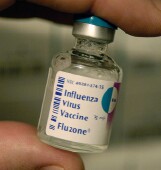- 8 Ways to Increase Dopamine Naturally
- 7 Best Breads for Maintaining Stable Blood Sugar
- Gelatin vs. Collagen: Which is Best for Skin, Nails, and Joints?
- The Long-Term Effects of Daily Turmeric Supplements on Liver Health
- Could Your Grocery Store Meat Be Causing Recurring UTIs?
- Are You Making This Expensive Thermostat Error This Winter?
- Recognizing the Signs of Hypothyroidism
- 10 Strategies to Overcome Insomnia
- Could Artificial Sweeteners Be Aging the Brain Faster?
- Techniques for Soothing Your Nervous System
Flu Vaccine Prevented 6.6 Million Illnesses Last Season: CDC


THURSDAY, Dec. 12U.S. health officials would like every American aged 6 months and older to get a flu vaccine, and on Thursday they produced statistics they think should convince everyone to get vaccinated.
“In the 2012-2013 flu season, vaccinations prevented at least 6.6 million cases of flu-associated illness. They also prevented some 3.2 million [people from] seeing their doctor and 79,000 hospitalizations,” Dr. Tom Frieden, director of the U.S. Centers for Disease Control and Prevention, said during a noon press briefing.
The benefits of vaccination seen in 2012-2013 were greater than the CDC had seen before and were attributable to the severity of the season, he noted.
“Last year was a relatively severe season,” Frieden said. “Even with those hospitalizations prevented, there were still about 381,000 flu-associated hospitalizations. This is higher than we have seen during many flu seasons.”
During the last flu season, there were some 31.8 million influenza-associated illnesses and 14.4 million doctors visits for flu, according a CDC report in the Dec. 13 issue of the Morbidity and Mortality Weekly Report.
Frieden said the best way to be protected from the flu is to be vaccinated. Yet only 40 percent of Americans aged 6 months and older had been vaccinated by early November, he said.
Flu across the country is picking up and even greater activity is predicted in the coming weeks, Frieden said. Increased incidence has been seen in the Southeast and in some states beyond that area.
“We know that it will increase in the coming weeks and months, but we cannot predict where and when and how severe this year’s flu season will be,” he said. “What we can predict is that the best way you can protect yourself against flu is to get a flu vaccine. It’s not too late to get vaccinated.”
Also speaking at the press conference, Dr. Anne Schuchat, director of CDC’s National Center for Immunization and Respiratory Diseases, said, “Last year, flu hit early and it hit hard. This year, we are lucky because the flu season hasn’t taken off wildly yet, so it’s not too late for you to get vaccinated and to make sure you protect yourself and your family.”
Most of the hospitalizations prevented by vaccination last season were among people most at risk — the youngest and the oldest, Schuchat said. “The hospitalizations that we prevented were primarily among people over 65 and people under 5,” she said.
“We know we can do better,” she added. “If we could have reached 70 percent of the population getting the influenza vaccine last year, we could have prevented an additional 4.4 million illnesses and we could have prevented 30,000 more hospitalizations.”
In addition, 1.8 million doctor visits could have been prevented, the CDC researchers reported.
As of mid-November, an estimated 40 percent of Americans aged 6 months and older had received a flu shot — 39 percent of adults and 41 percent of children.
That’s 3 percent ahead of last year, Schuchat said. “Most of the increase is among adults getting vaccinated. That’s good news because we have been lagging behind in non-elderly adults getting vaccinated.”
Schuchat stressed that all pregnant women should get vaccinated to protect both themselves and their infants. Also, all health care workers need to be vaccinated, she said.
“We really don’t know what this flu season will be like, because most years the flu peaks between January and March,” Schuchat said. “But already three children have died from flu.”
More information
For more about seasonal flu, visit the U.S. Centers for Disease Control and Prevention.
Source: HealthDay
Copyright © 2026 HealthDay. All rights reserved.










